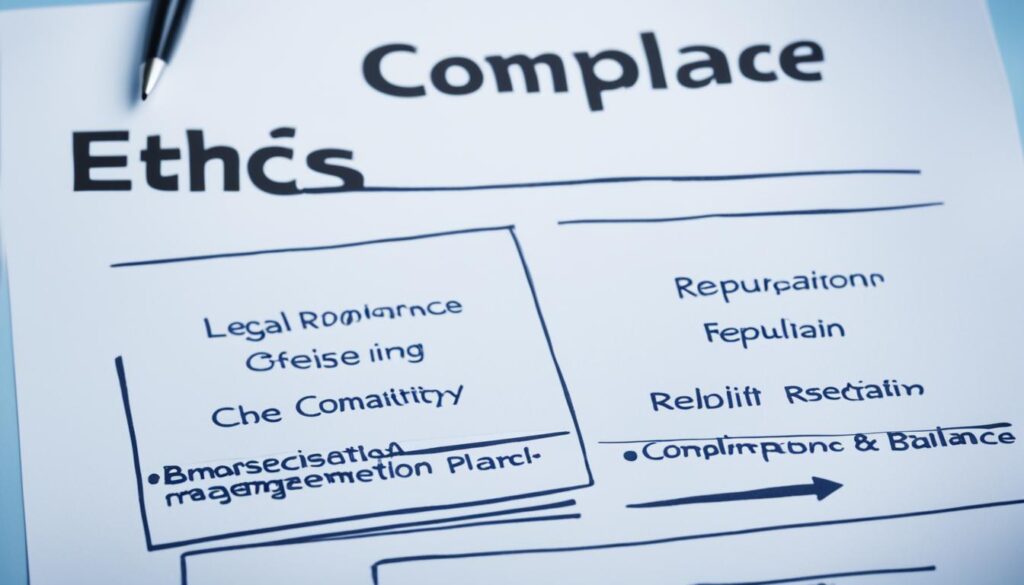Can we keep a great brand image and still stick to our values and the law? This is the big question in ethical reputation management. In our fast-paced digital world, companies must balance wanting a good public image with keeping ethical standards and following the law.
Reputation management uses various strategies to shape how people see an organization1. When done right, it can greatly increase trust with customers and help a company succeed over time1. But finding this balance is tricky.
https://www.youtube.com/watch?v=kpxAt8-dlLc
Good reputation management is more than just making a positive image. It means sticking to ethical ways and following the law. Companies that focus on ethics often get a better reputation, more trust from stakeholders, and more loyal customers2. This way, they not only build a good brand image but also create a responsible and accountable culture3.
We’ll look at how businesses can manage their reputation well while keeping ethical standards and following the law. We’ll cover the basics and share strategies to help you create a trustworthy and strong brand image.
Key Takeaways
- Ethical reputation management balances positive image with integrity
- Legal compliance is crucial in building long-term brand trust
- Ethical practices enhance stakeholder relationships and loyalty
- Balancing ethics and compliance leads to sustainable business success
- Reputation management strategies should align with company values
- Transparency and accountability are key in ethical reputation building
Understanding Reputation Management: An Overview
Reputation management is key in today’s fast online world. It means keeping an eye on how people see you or your brand online. This includes checking out your social media, review sites, and search engine results.
Why is online reputation management so important? Well, 90% of employers check out social media before hiring someone. And half of people Google someone before going on a date4. This shows how big of an impact our online actions have on our lives.
For businesses, it’s even more critical. Companies with good reputations get better talent and are worth more5. In fact, 65% of consumers trust online search results to help them decide what to buy. And almost all consumers trust a company with a good online reputation4.
Here are some key strategies for managing your reputation:
- Keep an eye on what people are saying online
- Share positive content
- Improve your search engine results
- Talk to customers on social media
- Handle negative feedback well
Remember, 85% of people trust reviews as much as personal advice6. This shows the importance of managing your online presence well. You should quickly respond to both good and bad feedback.
By using these strategies, companies can build a strong brand reputation. This helps keep customers loyal and leads to success online.
The Intersection of Ethics and Legal Compliance in Reputation Management

In managing reputations, ethics and legal rules are key. Companies seen as ethical draw more customers. A study showed 81% of people would switch to a brand that supports a cause they like. And 70% are willing to pay more for products from companies that care about social issues7.
Being open and taking responsibility builds trust. Companies helping their communities see a boost in their reputation. 89% of consumers say they’ll support businesses that give back to society7. This shows how important ethical actions are in how people see us.
Following the law is just as crucial. Not following rules can lead to big fines, legal trouble, damage to reputation, and even criminal charges8. It’s clear that being ethical and legal go hand in hand. They show what a company values and its culture.
Being ethical does more than just improve how customers see us. In a survey, 82% of employees said they might leave for a company that is more ethical7. This shows how important it is to have a good work environment for keeping staff and keeping the company healthy.
Being ethical is also good for the bottom line. Research found that the top 100 companies known for being ethical did 16% better financially than the average7. This link between being ethical and doing well financially shows the long-term benefits of focusing on ethics in managing reputations.
By mixing ethical actions with following the law, companies can build strong reputations. This approach reduces risks and boosts efficiency. It shows accountability, laying a solid base for lasting success.
Core Ethical Principles in Reputation Management
In reputation management, ethical principles are key to trust and credibility. We see transparency, honesty, and fairness as vital for strong relationships with everyone involved. Our dedication to social responsibility leads us to make choices that help our organization and society.
Being honest in reputation management means acting in line with our values. It’s about doing what’s right, even when no one is watching. This builds trust, which is key for lasting success. Customers trust businesses that act ethically, making them more appealing for partnerships and investments9.

A survey showed that 80% of CGMA holders focus on protecting their reputation by being ethical. Also, 76% said their employers value their ethics commitment highly10. This shows how important ethical choices are for a good corporate image.
“Ethics is knowing the difference between what you have a right to do and what is right to do.” – Potter Stewart
Being ethical helps build a strong reputation, which gives a competitive edge and keeps customers loyal9. On the other hand, being unethical can harm your reputation, lead to losing customers, and hurt your finances. To build an ethical culture, 78% of companies focus on following the rules, and 76% make ethical decisions in leadership10.
| Ethical Principle | Impact on Reputation | Implementation Strategy |
|---|---|---|
| Transparency | Builds trust and credibility | Regular stakeholder communications |
| Honesty | Enhances brand integrity | Truthful advertising and reporting |
| Fairness | Promotes stakeholder loyalty | Equitable treatment of all parties |
| Social Responsibility | Improves public perception | Community engagement initiatives |
By following these core ethical principles, we lay a strong foundation for managing our reputation well. This approach protects our reputation and helps us succeed and sustain in a business world that cares more about ethics.
Legal Frameworks Governing Reputation Management Practices
Reputation management is under many legal rules. These include laws on data protection, privacy, defamation, copyright, and consumer protection. Companies must be careful to follow these laws to keep a good reputation and avoid legal trouble.
Data protection laws, like the GDPR, are key in managing reputation. They tell companies how to handle personal information. Privacy laws also give people control over their data. Companies that respect data protection and privacy gain more trust from their customers11.
Defamation laws protect people and businesses from false statements that damage their reputation. Copyright laws protect creative works, making sure reputation management doesn’t cross legal lines. Consumer protection laws set fair business standards, affecting how companies deal with customers and their public image.
“Understanding the laws and standards that govern companies across industries is critical in developing a compliance management system.”
It’s important to keep up with changing laws for good reputation management. Regular checks, support from top leaders, and a focus on compliance are key for companies. By being open and ethical, companies can protect their brand and reputation, leading to a strong image over time11.
Companies that focus on ethics often do better in business and have happier employees. For example, fair trade in chocolate has improved working conditions and pay for workers in poor countries12. This ethical way not only follows the law but also builds a positive company culture and supports sustainable business.
Ethics and legal compliance in reputation management: Striking the Right Balance

Finding the right balance between ethics and legal rules in managing reputation is key for businesses. We need to tackle ethical challenges while following the law. This means good corporate leadership, talking to stakeholders, and managing risks well.
Companies that focus on ethics usually have a strong reputation. They draw in more customers and partners. They also keep customers and employees happy13. In fact, being ethical can lead to better money performance and happier employees14.
Legal rules are very important in managing reputation. Following these rules can lower the chance of fines and keep a company’s good name and money safe13. It’s key to make ethics policies that fit with tech changes and keep them the same across the company14.
“Ethics is knowing the difference between what you have a right to do and what is right to do.” – Potter Stewart
To get the right balance, we suggest:
- Creating clear ethics rules
- Offering regular training on following the law
- Using risk management tools to spot and check risks
- Doing regular checks to find weak spots in following the law
- Using employee surveys to get a full view of how programs work15
By linking corporate citizenship with making decisions, companies can better connect with stakeholders. This helps improve ethics and compliance efforts14. This way, companies can manage their reputation well, meet legal standards, and draw in the best talent15.
| Ethical Approach | Benefits |
|---|---|
| Clear ethics guidelines | Consistency in policies and practices |
| Ongoing training | Increased employee awareness |
| Risk management software | Better identification of potential risks |
| Periodic audits | Identification of program weaknesses |
| Employee surveys | Holistic understanding of program impact |
Implementing Ethical Reputation Management Strategies
We think it’s key to build an ethical culture for good reputation management. We create detailed ethical training for our employees. This training helps them make right choices. It teaches them about corporate social responsibility and ESG principles, so they know how to keep our reputation strong16.
We make sure everyone can talk openly about ethical issues. We have strong policies for whistleblowers, so they can speak up safely. This way, we build trust with everyone and make our online image better16.

We stick to ethical ways online too. We don’t use fake reviews or misleading info, as it’s not right and can be illegal1716. We prefer real talks and clear info to make a good name for ourselves.
| Ethical Strategy | Impact on Reputation |
|---|---|
| Authentic Content | Builds credibility and trust |
| Transparent Practices | Enhances stakeholder relationships |
| ESG Initiatives | Demonstrates social responsibility |
| Whistleblower Protection | Encourages ethical behavior |
With these ethical strategies, we lay a solid base for managing our reputation well over time. Our methods not only shield us from risks but also make us seen as trustworthy and responsible online.
Challenges and Solutions in Ethical Reputation Management
Ethical reputation management has big hurdles in today’s digital world. Companies deal with conflicts of interest, bad behavior, and privacy issues. A study found that 78% of consumers pick businesses based on ethics, showing how crucial a good reputation is18.
Online reviews are a big challenge. In healthcare, 72% of people use ratings to pick doctors, and most want ratings of four stars or more19. This shows the need for good crisis management and fixing a bad reputation.
To overcome these problems, companies should have clear rules and strong ethics codes. Being open about business practices builds trust by 91%, showing the power of clear communication18. They also need to protect sensitive info with strong security.
Good solutions include:
- Regular ethics training for employees
- Quick and professional answers to negative feedback
- Leading with ethical values
- Always checking how you manage your reputation
Putting ethics first can make employees happier by 15% and keep them around 12% longer18. This shows that being ethical not only wins over customers but also makes a better work culture.
“Ethics is knowing the difference between what you have a right to do and what is right to do.” – Potter Stewart
Fixing a reputation is more than just fixing mistakes. It’s about building a culture of honesty in every part of the company. This way, businesses can handle the tough parts of ethical reputation management and earn trust from everyone involved.
Conclusion
In today’s business world, being ethical and following the law is key to lasting success. Companies that focus on these areas get a better reputation and keep customers20. This shows that 88% of buyers worldwide like companies that source ethically21.
Managing your reputation means keeping up with changing ethical and legal standards. Businesses must follow laws in areas like finance and supply chain. They should also train their staff well20. This helps avoid legal issues and customer complaints. It also makes a company stand out by showing it cares about doing the right thing and being open20.
Being seen as ethical affects many parts of a business. For example, 77% of adults look at a company’s culture before they apply for a job. And 73% won’t even apply if the company’s values don’t match their own21. To keep trust and a good image, companies should be open, protect customer data, and handle it safely in their reputation management22. This way, they can keep doing well and gain trust in a market that cares more about ethics.
FAQ
What is reputation management?
Why are ethical standards and legal compliance crucial in reputation management?
What does reputation management encompass?
How does reputation management differ from brand reputation marketing?
Why are ethics and legal compliance crucial for businesses?
What are some core ethical principles in reputation management?
What legal frameworks govern reputation management practices?
How can organizations strike the right balance between ethics and legal compliance?
How can organizations implement ethical reputation management strategies?
What are some challenges and solutions in ethical reputation management?
Source Links
- What is Reputation Management? Definition, Importance, and Strategies – https://reputationstacker.com/reputation-management-definition-importance-and-strategies/
- Business Ethics: how does it drive sustainable success? – https://www.imd.org/blog/sustainability/business-ethics/
- Upholding Ethics in the Professional Work Environment – https://www.linkedin.com/pulse/upholding-ethics-professional-work-environment-ahmed-gamal-el-deen-vgvsf
- Reputation – https://www.reputationx.com/reputation
- Reputation and Its Risks – https://hbr.org/2007/02/reputation-and-its-risks
- What Is Reputation Management? Definition, Process and Ethics – https://blog.reputationx.com/whats-reputation-management
- Reputation management: Social Responsibility: Social Responsibility: Integrating Ethics into Reputation Management – FasterCapital – https://www.fastercapital.com/content/Reputation-management–Social-Responsibility–Social-Responsibility–Integrating-Ethics-into-Reputation-Management.html
- Upholding Legal and Ethical Compliance in Financial Controlling: A vital Pillar for sustainable success – https://www.linkedin.com/pulse/upholding-legal-ethical-compliance-financial-controlling-pn6qe
- The Role of Ethics in Business: Building Trust and Reputation – https://xeinadin.com/blog/the-role-of-ethics-in-business-building-trust-and-reputation/
- Ethics, reputation, and compliance gain as corporate priorities – https://www.journalofaccountancy.com/issues/2015/mar/business-ethics-and-compliance.html
- Compliance Management: A Comprehensive Guide | SafetyCulture – https://safetyculture.com/topics/compliance-management/
- Reputation management: Ethical Business Practices: Integrity as Policy: Ethical Business Practices for Reputation Management – FasterCapital – https://www.fastercapital.com/content/Reputation-management–Ethical-Business-Practices–Integrity-as-Policy–Ethical-Business-Practices-for-Reputation-Management.html
- The Importance of Business Ethics and Regulatory Compliance – https://www.belzuz.net/en/publications/in-english/item/11912-the-importance-of-business-ethics-and-regulatory-compliance.html
- How to Monitor and Manage Legal and Ethical Issues – https://info.knowledgeleader.com/how-to-monitor-and-manage-legal-and-ethical-issues
- Balancing Corporate Compliance with Business Goals – https://ironcladapp.com/journal/contract-management/corporate-compliance/
- Ethical Online Reputation Services, Recover Reputation – https://www.recoverreputation.com/online-reputation-management-ethics/
- Online reputation and how ethical it is repair (2022) – https://www.gdpreu.org/online-reputation-and-how-ethical-it-is-repair-2022/
- Reputation management: Ethical Practices: Ethical Practices: The Cornerstone of Reputation Management – FasterCapital – https://www.fastercapital.com/content/Reputation-management–Ethical-Practices–Ethical-Practices–The-Cornerstone-of-Reputation-Management.html
- Legal and Ethical Aspects of Healthcare Reputation Management – https://www.repugen.com/blog/legal-ethical-aspects-of-healthcare-reputation-management
- Why Compliance is Key to Building Trust and Reputation in Industry! – Supply Chain Game Changer™ – https://supplychaingamechanger.com/why-compliance-is-key-to-building-trust-and-reputation-in-industry/
- The Impact of Unethical Behavior on Company Reputation | – https://www.redflagreporting.com/the-impact-of-unethical-behavior-on-company-reputation/
- What Are The Ethical Considerations In Online Reputation Management – FasterCapital – https://fastercapital.com/topics/what-are-the-ethical-considerations-in-online-reputation-management.html

